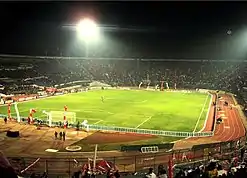Portal:Chile
| Main page | Assessment | Articles | Templates | Translation | Noticeboard | To Do List | Portal |
The Chile Portal

Chile, officially the Republic of Chile, is a country located in western South America. It is the southernmost country in the world and the closest to Antarctica, stretching along a narrow strip of land between the Andes Mountains and the Pacific Ocean. With an area of 756,096 square kilometers (291,930 sq mi) and a population of 17.5 million as of 2017, Chile shares borders with Peru to the north, Bolivia to the northeast, Argentina to the east, and the Drake Passage to the south. The country also controls several Pacific islands, including Juan Fernández, Isla Salas y Gómez, Desventuradas, and Easter Island, and claims about 1,250,000 square kilometers (480,000 sq mi) of Antarctica as the Chilean Antarctic Territory. The capital and largest city of Chile is Santiago, and the national language is Spanish.
Spain conquered and colonized the region in the mid-16th century, replacing Inca rule, but failed to conquer the independent Mapuche people who inhabited what is now south-central Chile. Chile emerged as a relatively stable authoritarian republic in the 1830s after their 1818 declaration of independence from Spain. During the 19th century, Chile experienced significant economic and territorial growth, putting an end to Mapuche resistance in the 1880s and gaining its current northern territory in the War of the Pacific (1879–83) by defeating Peru and Bolivia. In the 20th century, up until the 1970s, Chile underwent a process of democratization and experienced rapid population growth and urbanization, while relying increasingly on exports from copper mining to support its economy. During the 1960s and 1970s, the country was marked by severe left-right political polarization and turmoil, which culminated in the 1973 Chilean coup d'état that overthrew Salvador Allende's democratically elected left-wing government. This was followed by a 16-year right-wing military dictatorship under Augusto Pinochet, which resulted in more than 3,000 deaths or disappearances. The regime ended in 1990, following a referendum in 1988, and was succeeded by a center-left coalition, which ruled until 2010.
Chile has a high-income economy and is one of the most economically and socially stable nations in South America, leading Latin America in competitiveness, per capita income, globalization, peace, and economic freedom. Chile also performs well in the region in terms of sustainability of the state and democratic development, and boasts the second lowest homicide rate in the Americas, following only Canada. Chile is a founding member of the United Nations, the Community of Latin American and Caribbean States (CELAC), and the Pacific Alliance, and joined the OECD in 2010. (Full article...)
 Good article -
Good article -
Sollipulli (Spanish pronunciation: [soʝiˈpuʝi]; lit. 'reddish mountain' in the Mapuche language) is an ice-filled volcanic caldera and volcanic complex, which lies southeast of the small town of Melipeuco in the La Araucanía Region, Chile. It is part of the Southern Volcanic Zone of the Andes, one of the four volcanic belts in the Andes chain.
The volcano has evolved in close contact with glacial ice. It differs from many calderas in that Sollipulli appears to have collapsed in a non-explosive manner. The age of collapse is not yet known, but it is presently filled with ice to thicknesses of 650 m (2,130 ft). The ice drains through two glaciers in the west and the north of the caldera. Sollipulli has developed on a basement formed by Mesozoic and Cenozoic geological formations. (Full article...)Selected biography -
Pablo Neruda (/nəˈruːdə/; Spanish pronunciation: [ˈpaβlo neˈɾuða] ⓘ; born Ricardo Eliécer Neftalí Reyes Basoalto; 12 July 1904 – 23 September 1973) was a Chilean poet-diplomat and politician who won the 1971 Nobel Prize in Literature. Neruda became known as a poet when he was 13 years old and wrote in a variety of styles, including surrealist poems, historical epics, political manifestos, a prose autobiography, and passionate love poems such as the ones in his collection Twenty Love Poems and a Song of Despair (1924)...
Neruda occupied many diplomatic positions in various countries during his lifetime and served a term as a Senator for the Chilean Communist Party. When President Gabriel González Videla outlawed communism in Chile in 1948, a warrant was issued for Neruda's arrest. Friends hid him for months in the basement of a house in the port city of Valparaíso, and in 1949, he escaped through a mountain pass near Maihue Lake into Argentina; he would not return to Chile for more than three years. He was a close advisor to Chile's socialist President Salvador Allende, and when he got back to Chile after accepting his Nobel Prize in Stockholm, Allende invited him to read at the Estadio Nacional before 70,000 people. (Full article...)Selected article -
General images
Did you know (auto generated)
- ... that Salar de Pedernales in Chile features dark slope streaks resembling dark slope streaks on Mars?
- ... that Daniela Ceballos worked with the Football Federation of Chile to supervise safety protocols during the COVID-19 pandemic while playing football herself?
- ... that German-Chilean research psychologist Susana Bloch created a technique actors have been using to access their basic emotions?
- ... that Monturaqui crater in Chile is threatened by human action?
- ... that Salar de Pajonales in Chile has been used as an analogue for environments on Mars?
- ... that Chilean psychologist Neva Milicic Müller wrote a book about parent–child separation that can help children and caregivers during COVID-19 lockdowns?
Topics
Categories
Recognized content
| This is a list of recognized content, updated weekly by JL-Bot (talk · contribs) (typically on Saturdays). There is no need to edit the list yourself. If an article is missing from the list, make sure it is tagged (e.g. {{WikiProject Chile}}) or categorized correctly and wait for the next update. See WP:RECOG for configuration options. |
Featured articles
- Chilean battleship Almirante Latorre
- Almirante Latorre-class battleship
- Cerro Azul (Chile volcano)
- Calabozos
- Decipherment of rongorongo
- El Tatio
- Chilean cruiser Esmeralda (1883)
- Laguna del Maule (volcano)
- Mothers of the Disappeared
- Pali-Aike volcanic field
- Pisco sour
- South American dreadnought race
- Taapaca
Good articles
- 2010 Pichilemu earthquakes
- 2018 Santiago ePrix
- Agustín Ross Cultural Centre
- Angata
- Los Ángeles Negros
- Apacheta-Aguilucho volcanic complex
- Argentine–Chilean naval arms race
- Atamu Tekena
- Orlando Bosch
- Lorenza Böttner
- Sara Braun
- Monte Burney
- Battle of Caldera Bay
- Felipe Camiroaga
- Chilean battleship Capitán Prat
- Carménère
- José María Caro Martínez
- Chile at the 2014 Winter Paralympics
- Coat of arms of Pichilemu
- Dutch expedition to Valdivia
- El Laco
- Milton Friedman
- Fueguino
- Guallatiri
- Irruputuncu
- Laguna del Negro Francisco
- Lascar (volcano)
- Lastarria
- Lazufre
- Licancabur
- Licancabur Lake
- Llullaillaco
- Nevado de Longaví
- Manuel Foster Observatory
- Miscanti Lake
- Monturaqui
- Irene Morales
- John Thomas North
- Obligation to Negotiate Access to the Pacific Ocean
- Ojos del Salado
- Olca-Paruma
- USS Oneota (1864)
- La Pacana
- Parinacota (volcano)
- Patio 29
- Pichilemu
- Colegio de la Preciosa Sangre de Pichilemu
- Salar de Punta Negra
- Reclus (volcano)
- Murders of María José Reyes and Juan Duarte
- Sammis Reyes
- Riro Kāinga
- Sairecabur
- Salar Ignorado
- San Pedro (Chile volcano)
- Socompa
- Sollipulli
- Tacora
- Tilocálar
- Nevado Tres Cruces
- Tupungatito
- Tuyajto Lake
Featured pictures
 360-degree Panorama of the Southern Sky edit
360-degree Panorama of the Southern Sky edit A 360 degree panorama of a unique cloudscape over La Silla
A 360 degree panorama of a unique cloudscape over La Silla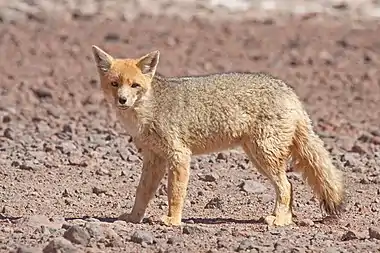 Culpeo MC
Culpeo MC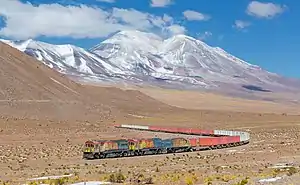 FCAB EMD GT22CU-3 San Pedro - Ascotan
FCAB EMD GT22CU-3 San Pedro - Ascotan Laguna Miñiques, Chile, 2016-02-08, DD 33-38 PAN
Laguna Miñiques, Chile, 2016-02-08, DD 33-38 PAN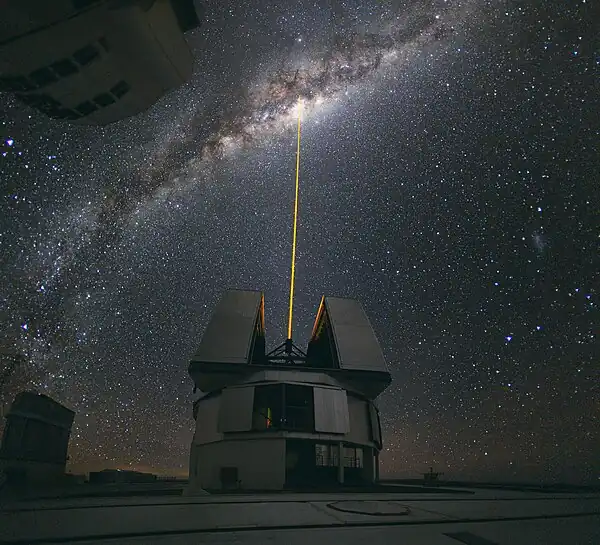 Laser Towards Milky Ways Centre
Laser Towards Milky Ways Centre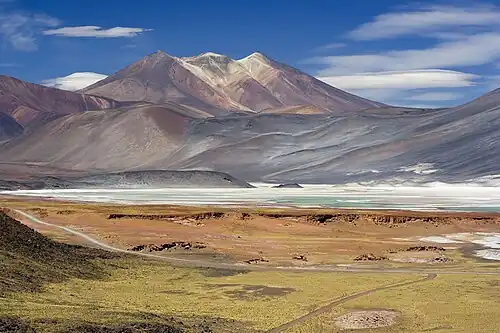 Miscanti Lagoon near San Pedro de Atacama Chile Luca Galuzzi 2006
Miscanti Lagoon near San Pedro de Atacama Chile Luca Galuzzi 2006 Moai Rano raraku
Moai Rano raraku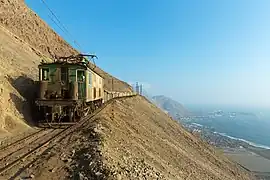 SQM GE 289A Boxcab Carmelita - Reverso
SQM GE 289A Boxcab Carmelita - Reverso Volcán San Pedro, Chile, 2016-02-09, DD 18
Volcán San Pedro, Chile, 2016-02-09, DD 18
WikiProjects
Related portals
New articles
Rules | Match log | Results page (for watching) | Last updated: 2023-10-24 20:00 (UTC)
Note: The list display can now be customized by each user. See List display personalization for details.
- Francisco Javier Correa Errázuriz (edit | talk | history | links | watch | logs | tools) by Old-AgedKid (talk · contribs · new pages (12)) started on 2023-10-24, score: 28
- Swimming at the 2023 Pan American Games – Men's 100 metre freestyle (edit | talk | history | links | watch | logs | tools) by Epluribusunumyall (talk · contribs · new pages (15)) started on 2023-10-24, score: 28
- Quemel Farías (edit | talk | history | links | watch | logs | tools) by ImSnot (talk · contribs · new pages (5)) started on 2023-10-24, score: 63
- Placomaronea minima (edit | talk | history | links | watch | logs | tools) by Esculenta (talk · contribs · new pages (69)) started on 2023-10-24, score: 43
- Placomaronea kaernefeltii (edit | talk | history | links | watch | logs | tools) by Esculenta (talk · contribs · new pages (69)) started on 2023-10-24, score: 15
- Tae-Ku Park (edit | talk | history | links | watch | logs | tools) by Words in the Wind (talk · contribs · new pages (12)) started on 2023-10-24, score: 35
- Taekwondo at the 2023 Pan American Games – Men's 80 kg (edit | talk | history | links | watch | logs | tools) by Alibene567 (talk · contribs · new pages (7)) started on 2023-10-24, score: 28
- Taekwondo at the 2023 Pan American Games – Men's +80 kg (edit | talk | history | links | watch | logs | tools) by Alibene567 (talk · contribs · new pages (7)) started on 2023-10-24, score: 28
- List of international goals scored by Memphis Depay (edit | talk | history | links | watch | logs | tools) by Ca (talk · contribs · new pages (17)) started on 2023-10-24, score: 16
- Magdalena Gómez (field hockey) (edit | talk | history | links | watch | logs | tools) by Lachie23 (talk · contribs · new pages (15)) started on 2023-10-24, score: 14
- Agustina Taborda (edit | talk | history | links | watch | logs | tools) by Lachie23 (talk · contribs · new pages (15)) started on 2023-10-24, score: 14
- Cycling at the 2023 Pan American Games – Women's BMX racing (edit | talk | history | links | watch | logs | tools) by JuliánLeiva66 (talk · contribs · new pages (31)) started on 2023-10-24, score: 28
- Cycling at the 2023 Pan American Games – Men's BMX racing (edit | talk | history | links | watch | logs | tools) by JuliánLeiva66 (talk · contribs · new pages (31)) started on 2023-10-24, score: 28
- Swimming at the 2023 Pan American Games – Men's 200 metre freestyle (edit | talk | history | links | watch | logs | tools) by Epluribusunumyall (talk · contribs · new pages (15)) started on 2023-10-23, score: 28
- Benjamín Moreno Bascur (edit | talk | history | links | watch | logs | tools) by Old-AgedKid (talk · contribs · new pages (12)) started on 2023-10-23, score: 43
- Taekwondo at the 2023 Pan American Games – Women's 57 kg (edit | talk | history | links | watch | logs | tools) by Words in the Wind (talk · contribs · new pages (12)) started on 2023-10-23, score: 28
- Tennis at the 2023 Pan American Games – Men's singles (edit | talk | history | links | watch | logs | tools) by Cristóbalrguacl (talk · contribs · new pages (1)) started on 2023-10-23, score: 28
- Roller sports at the 2023 Pan American Games – Women's park (edit | talk | history | links | watch | logs | tools) by JuliánLeiva66 (talk · contribs · new pages (31)) started on 2023-10-23, score: 28
- Roller sports at the 2023 Pan American Games – Men's park (edit | talk | history | links | watch | logs | tools) by JuliánLeiva66 (talk · contribs · new pages (31)) started on 2023-10-23, score: 28
- Gymnastics at the 2023 Pan American Games – Men's artistic team all-around (edit | talk | history | links | watch | logs | tools) by Mypurplelightsaber (talk · contribs · new pages (20)) started on 2023-10-23, score: 28
- Alstroemeria graminea (edit | talk | history | links | watch | logs | tools) by Flora and fauna man (talk · contribs · new pages (18)) started on 2023-10-23, score: 67
- Hymenophyllum cruentum (edit | talk | history | links | watch | logs | tools) by Flora and fauna man (talk · contribs · new pages (18)) started on 2023-10-23, score: 51
- Asplenium trilobum (edit | talk | history | links | watch | logs | tools) by Flora and fauna man (talk · contribs · new pages (18)) started on 2023-10-23, score: 51
- Pyrolirion tubiflorum (edit | talk | history | links | watch | logs | tools) by Flora and fauna man (talk · contribs · new pages (18)) started on 2023-10-23, score: 31
- Tama Te Ra'a Photovoltaic Plant (edit | talk | history | links | watch | logs | tools) by Chongkian (talk · contribs · new pages (64)) started on 2023-10-23, score: 31
- Chile–United Arab Emirates relations (edit | talk | history | links | watch | logs | tools) by Badass Flare (talk · contribs · new pages (3)) started on 2023-10-23, score: 43
- Athletics at the 2023 Pan American Games – Women's marathon (edit | talk | history | links | watch | logs | tools) by JuliánLeiva66 (talk · contribs · new pages (31)) started on 2023-10-22, score: 28
- Athletics at the 2023 Pan American Games – Men's marathon (edit | talk | history | links | watch | logs | tools) by JuliánLeiva66 (talk · contribs · new pages (31)) started on 2023-10-22, score: 28
- Water skiing at the 2023 Pan American Games – Women's wakeboard (edit | talk | history | links | watch | logs | tools) by JuliánLeiva66 (talk · contribs · new pages (31)) started on 2023-10-22, score: 28
- Water skiing at the 2023 Pan American Games – Men's wakeboard (edit | talk | history | links | watch | logs | tools) by JuliánLeiva66 (talk · contribs · new pages (31)) started on 2023-10-22, score: 28
- National Fisheries Service (edit | talk | history | links | watch | logs | tools) by Sietecolores (talk · contribs · new pages (5)) started on 2023-10-22, score: 31
- Water skiing at the 2023 Pan American Games – Women's slalom (edit | talk | history | links | watch | logs | tools) by JuliánLeiva66 (talk · contribs · new pages (31)) started on 2023-10-22, score: 28
- Water skiing at the 2023 Pan American Games – Men's slalom (edit | talk | history | links | watch | logs | tools) by JuliánLeiva66 (talk · contribs · new pages (31)) started on 2023-10-22, score: 28
- Swimming at the 2023 Pan American Games – Women's 100 metre breaststroke (edit | talk | history | links | watch | logs | tools) by JuliánLeiva66 (talk · contribs · new pages (31)) started on 2023-10-22, score: 28
- Tennis at the 2023 Pan American Games – Women's singles (edit | talk | history | links | watch | logs | tools) by Jqzhua (talk · contribs · new pages (1)) started on 2023-10-22, score: 22
- Roller sports at the 2023 Pan American Games – Men's street (edit | talk | history | links | watch | logs | tools) by JuliánLeiva66 (talk · contribs · new pages (31)) started on 2023-10-22, score: 28
- Kamren Larsen (edit | talk | history | links | watch | logs | tools) by Gecko696969 (talk · contribs · new pages (2)) started on 2023-10-17, score: 20
- Rowing at the 2023 Pan American Games – Mixed eight (edit | talk | history | links | watch | logs | tools) by JuliánLeiva66 (talk · contribs · new pages (31)) started on 2023-10-22, score: 22
- Augusto Böhme (edit | talk | history | links | watch | logs | tools) by Rancaguacl (talk · contribs · new pages (4)) started on 2023-10-22, score: 43
- Rowing at the 2023 Pan American Games – Women's single sculls (edit | talk | history | links | watch | logs | tools) by JuliánLeiva66 (talk · contribs · new pages (31)) started on 2023-10-22, score: 16
- Rowing at the 2023 Pan American Games – Men's single sculls (edit | talk | history | links | watch | logs | tools) by JuliánLeiva66 (talk · contribs · new pages (31)) started on 2023-10-22, score: 16
- Nicolás Garafulic (edit | talk | history | links | watch | logs | tools) by Rancaguacl (talk · contribs · new pages (4)) started on 2023-10-22, score: 43
- Rowing at the 2023 Pan American Games – Women's double sculls (edit | talk | history | links | watch | logs | tools) by JuliánLeiva66 (talk · contribs · new pages (31)) started on 2023-10-22, score: 16
- Rowing at the 2023 Pan American Games – Men's double sculls (edit | talk | history | links | watch | logs | tools) by JuliánLeiva66 (talk · contribs · new pages (31)) started on 2023-10-22, score: 16
- Swimming at the 2023 Pan American Games – Men's 100 metre breaststroke (edit | talk | history | links | watch | logs | tools) by Epluribusunumyall (talk · contribs · new pages (15)) started on 2023-10-22, score: 28
- Racquetball at the 2023 Pan American Games – Mixed doubles (edit | talk | history | links | watch | logs | tools) by JuliánLeiva66 (talk · contribs · new pages (31)) started on 2023-10-22, score: 28
- Racquetball at the 2023 Pan American Games – Women's doubles (edit | talk | history | links | watch | logs | tools) by JuliánLeiva66 (talk · contribs · new pages (31)) started on 2023-10-22, score: 28
- Racquetball at the 2023 Pan American Games – Men's doubles (edit | talk | history | links | watch | logs | tools) by JuliánLeiva66 (talk · contribs · new pages (31)) started on 2023-10-22, score: 28
- Racquetball at the 2023 Pan American Games – Women's singles (edit | talk | history | links | watch | logs | tools) by JuliánLeiva66 (talk · contribs · new pages (31)) started on 2023-10-22, score: 28
- Swimming at the 2023 Pan American Games – Women's 400 metre freestyle (edit | talk | history | links | watch | logs | tools) by Epluribusunumyall (talk · contribs · new pages (15)) started on 2023-10-22, score: 28
- Swimming at the 2023 Pan American Games – Men's 400 metre freestyle (edit | talk | history | links | watch | logs | tools) by Epluribusunumyall (talk · contribs · new pages (15)) started on 2023-10-22, score: 28
- List of World Heritage Sites in Bolivia (edit | talk | history | links | watch | logs | tools) by Tone (talk · contribs · new pages (1)) started on 2023-10-22, score: 14
- Racquetball at the 2023 Pan American Games – Men's singles (edit | talk | history | links | watch | logs | tools) by JuliánLeiva66 (talk · contribs · new pages (31)) started on 2023-10-22, score: 28
- Manuel Uribe (footballer) (edit | talk | history | links | watch | logs | tools) by SuperSkaterDude45 (talk · contribs · new pages (23)) started on 2023-10-22, score: 16
- Sport climbing at the 2023 Pan American Games – Women's speed (edit | talk | history | links | watch | logs | tools) by JuliánLeiva66 (talk · contribs · new pages (31)) started on 2023-10-22, score: 28
- Basketball at the 2023 Pan American Games – Men's 3x3 tournament (edit | talk | history | links | watch | logs | tools) by Epluribusunumyall (talk · contribs · new pages (15)) started on 2023-10-22, score: 28
- Rowing at the 2023 Pan American Games – Men's coxless pair (edit | talk | history | links | watch | logs | tools) by JuliánLeiva66 (talk · contribs · new pages (31)) started on 2023-10-21, score: 16
- Basketball at the 2023 Pan American Games – Women's 3x3 tournament (edit | talk | history | links | watch | logs | tools) by Epluribusunumyall (talk · contribs · new pages (15)) started on 2023-10-21, score: 28
- Rowing at the 2023 Pan American Games – Women's coxless pair (edit | talk | history | links | watch | logs | tools) by JuliánLeiva66 (talk · contribs · new pages (31)) started on 2023-10-21, score: 16
- Baseball at the 2023 Pan American Games – Men's team rosters (edit | talk | history | links | watch | logs | tools) by Epluribusunumyall (talk · contribs · new pages (15)) started on 2023-10-21, score: 16
- Football at the 2023 Pan American Games – Women's team squads (edit | talk | history | links | watch | logs | tools) by Raphaelcoliveira (talk · contribs · new pages (3)) started on 2023-10-18, score: 20
- Cycling at the 2023 Pan American Games – Women's cross-country (edit | talk | history | links | watch | logs | tools) by JuliánLeiva66 (talk · contribs · new pages (31)) started on 2023-10-21, score: 28
- Roller sports at the 2023 Pan American Games – Women's street (edit | talk | history | links | watch | logs | tools) by JuliánLeiva66 (talk · contribs · new pages (31)) started on 2023-10-21, score: 28
- Cycling at the 2023 Pan American Games – Men's cross-country (edit | talk | history | links | watch | logs | tools) by JuliánLeiva66 (talk · contribs · new pages (31)) started on 2023-10-21, score: 28
- Paola Troncoso (edit | talk | history | links | watch | logs | tools) by Stewpot (talk · contribs · new pages (1)) started on 2023-10-21, score: 43
- List of ship launches in 1840 (edit | talk | history | links | watch | logs | tools) by Mjroots (talk · contribs · new pages (10)) started on 2023-10-21, score: 16
- Swimming at the 2023 Pan American Games (edit | talk | history | links | watch | logs | tools) by Sportsfan 1234 (talk · contribs · new pages (24)) started on 2023-10-21, score: 28
- 2023 Pan American Games medal table (edit | talk | history | links | watch | logs | tools) by Sportsfan 1234 (talk · contribs · new pages (24)) started on 2023-10-21, score: 28
- Taekwondo at the 2023 Pan American Games – Women's 49 kg (edit | talk | history | links | watch | logs | tools) by Sportsfan 1234 (talk · contribs · new pages (24)) started on 2023-10-21, score: 28
- Taekwondo at the 2023 Pan American Games – Men's 68 kg (edit | talk | history | links | watch | logs | tools) by Sportsfan 1234 (talk · contribs · new pages (24)) started on 2023-10-21, score: 28
- Taekwondo at the 2023 Pan American Games – Men's 58 kg (edit | talk | history | links | watch | logs | tools) by Sportsfan 1234 (talk · contribs · new pages (24)) started on 2023-10-21, score: 28
- Taekwondo at the 2023 Pan American Games – Women's poomsae individual (edit | talk | history | links | watch | logs | tools) by Sportsfan 1234 (talk · contribs · new pages (24)) started on 2023-10-21, score: 28
- Taekwondo at the 2023 Pan American Games – Men's poomsae individual (edit | talk | history | links | watch | logs | tools) by Sportsfan 1234 (talk · contribs · new pages (24)) started on 2023-10-21, score: 28
- Saint Kitts and Nevis at the 2023 Pan American Games (edit | talk | history | links | watch | logs | tools) by Sportsfan 1234 (talk · contribs · new pages (24)) started on 2023-10-21, score: 28
- Beach volleyball at the 2023 Pan American Games – Men's tournament (edit | talk | history | links | watch | logs | tools) by Sportsfan 1234 (talk · contribs · new pages (24)) started on 2023-10-20, score: 28
- Beach volleyball at the 2023 Pan American Games – Women's tournament (edit | talk | history | links | watch | logs | tools) by Sportsfan 1234 (talk · contribs · new pages (24)) started on 2023-10-20, score: 28
- Autopoiética (edit | talk | history | links | watch | logs | tools) by Cinnamonboy13 (talk · contribs · new pages (2)) started on 2023-10-19, score: 15
- Timeline of the Lutheran Church – Missouri Synod (edit | talk | history | links | watch | logs | tools) by Indyguy (talk · contribs · new pages (1)) started on 2023-10-19, score: 14
- Skull Island: Rise of Kong (edit | talk | history | links | watch | logs | tools) by EnzoTC (talk · contribs · new pages (1)) started on 2023-10-19, score: 23
- Alberto Jerez Horta (edit | talk | history | links | watch | logs | tools) by Jmanlucas (talk · contribs · new pages (33)) started on 2023-10-19, score: 43
- Tristagma bivalve (edit | talk | history | links | watch | logs | tools) by Flora and fauna man (talk · contribs · new pages (18)) started on 2023-10-19, score: 47
- Leucocoryne alliacea (edit | talk | history | links | watch | logs | tools) by Flora and fauna man (talk · contribs · new pages (18)) started on 2023-10-19, score: 16
- Miersia chilensis (edit | talk | history | links | watch | logs | tools) by Flora and fauna man (talk · contribs · new pages (18)) started on 2023-10-19, score: 16
- Del Campo (surname) (edit | talk | history | links | watch | logs | tools) by MrKeefeJohn (talk · contribs · new pages (41)) started on 2023-10-19, score: 16
- Gilliesia montana (edit | talk | history | links | watch | logs | tools) by Flora and fauna man (talk · contribs · new pages (18)) started on 2023-10-19, score: 31
- French roll (edit | talk | history | links | watch | logs | tools) by Melsj (talk · contribs · new pages (14)) started on 2023-10-19, score: 23
- Basketball at the 2023 Pan American Games – Women's team rosters (edit | talk | history | links | watch | logs | tools) by Raphaelcoliveira (talk · contribs · new pages (3)) started on 2023-10-18, score: 20
- Stomatotachina (edit | talk | history | links | watch | logs | tools) by Simuliid (talk · contribs · new pages (115)) started on 2023-10-18, score: 23
- Miss Grand International 2015 (edit | talk | history | links | watch | logs | tools) by Thomson Walt (talk · contribs · new pages (9)) started on 2023-10-18, score: 16
- Miss Grand International 2014 (edit | talk | history | links | watch | logs | tools) by Thomson Walt (talk · contribs · new pages (9)) started on 2023-10-18, score: 26
- Adam Loga (edit | talk | history | links | watch | logs | tools) by Zadora13 (talk · contribs · new pages (1)) started on 2023-10-18, score: 35
- Pablo Galilea (edit | talk | history | links | watch | logs | tools) by Old-AgedKid (talk · contribs · new pages (12)) started on 2023-10-18, score: 31
- Placopsis lambii (edit | talk | history | links | watch | logs | tools) by Esculenta (talk · contribs · new pages (69)) started on 2023-10-18, score: 16
- Football at the 2023 Pan American Games – Women's team rosters (edit | talk | history | links | watch | logs | tools) by Raphaelcoliveira (talk · contribs · new pages (3)) started on 2023-10-18, score: 20
- Florencia Peñalba (edit | talk | history | links | watch | logs | tools) by Lachie23 (talk · contribs · new pages (15)) started on 2023-10-18, score: 20
- Sol Amadeo (edit | talk | history | links | watch | logs | tools) by Lachie23 (talk · contribs · new pages (15)) started on 2023-10-18, score: 14
- Kaisuami Dall'Orso (edit | talk | history | links | watch | logs | tools) by Lachie23 (talk · contribs · new pages (15)) started on 2023-10-18, score: 14
- Diving at the 2023 Pan American Games – Women's 1 metre springboard (edit | talk | history | links | watch | logs | tools) by Sportsfan 1234 (talk · contribs · new pages (24)) started on 2023-10-18, score: 28
- Diving at the 2023 Pan American Games – Men's synchronized 10 metre platform (edit | talk | history | links | watch | logs | tools) by Sportsfan 1234 (talk · contribs · new pages (24)) started on 2023-10-18, score: 28
- Diving at the 2023 Pan American Games – Men's 1 metre springboard (edit | talk | history | links | watch | logs | tools) by Sportsfan 1234 (talk · contribs · new pages (24)) started on 2023-10-18, score: 28
- Solar eclipse of November 3, 1994 (edit | talk | history | links | watch | logs | tools) by JPxG (talk · contribs · new pages (30)) started on 2023-10-18, score: 16
- Basketball at the 2023 Pan American Games – Men's team rosters (edit | talk | history | links | watch | logs | tools) by Raphaelcoliveira (talk · contribs · new pages (3)) started on 2023-10-18, score: 24
- Lupe Curutchague (edit | talk | history | links | watch | logs | tools) by Lachie23 (talk · contribs · new pages (15)) started on 2023-10-17, score: 20
- Tailings dam failure (edit | talk | history | links | watch | logs | tools) by FrViPofm (talk · contribs · new pages (1)) started on 2023-10-17, score: 14
- Cristian Leay (edit | talk | history | links | watch | logs | tools) by Old-AgedKid (talk · contribs · new pages (12)) started on 2023-10-17, score: 43
- Dominica at the 2023 Pan American Games (edit | talk | history | links | watch | logs | tools) by Felipe.moraislima (talk · contribs · new pages (5)) started on 2023-10-17, score: 28
- Roberto León (edit | talk | history | links | watch | logs | tools) by Old-AgedKid (talk · contribs · new pages (12)) started on 2023-10-17, score: 43
- Diving at the 2023 Pan American Games – Women's 10 metre platform (edit | talk | history | links | watch | logs | tools) by Sportsfan 1234 (talk · contribs · new pages (24)) started on 2023-10-17, score: 28
- María Barreiro (edit | talk | history | links | watch | logs | tools) by Lachie23 (talk · contribs · new pages (15)) started on 2023-10-17, score: 20
- Jimena García (edit | talk | history | links | watch | logs | tools) by Lachie23 (talk · contribs · new pages (15)) started on 2023-10-16, score: 20
- Elisa Civetta (edit | talk | history | links | watch | logs | tools) by Lachie23 (talk · contribs · new pages (15)) started on 2023-10-16, score: 20
- Viola portalesia (edit | talk | history | links | watch | logs | tools) by Flora and fauna man (talk · contribs · new pages (18)) started on 2023-10-16, score: 16
- Viola rubella (edit | talk | history | links | watch | logs | tools) by Flora and fauna man (talk · contribs · new pages (18)) started on 2023-10-16, score: 36
- Milagros Algorta (edit | talk | history | links | watch | logs | tools) by Lachie23 (talk · contribs · new pages (15)) started on 2023-10-16, score: 14
- Constanza Barrandeguy (edit | talk | history | links | watch | logs | tools) by Lachie23 (talk · contribs · new pages (15)) started on 2023-10-16, score: 14
- Azorella monteroi (edit | talk | history | links | watch | logs | tools) by Flora and fauna man (talk · contribs · new pages (18)) started on 2023-10-16, score: 31
- Hard Rock Cafe locations (edit | talk | history | links | watch | logs | tools) by Djyueng (talk · contribs · new pages (2)) started on 2023-10-16, score: 16
- 34th Palm Springs International Film Festival (edit | talk | history | links | watch | logs | tools) by JuliánLeiva66 (talk · contribs · new pages (31)) started on 2023-10-15, score: 14
- Javiera Rubilar (edit | talk | history | links | watch | logs | tools) by ThiagoSimoes (talk · contribs · new pages (11)) started on 2023-10-15, score: 15
- Camila Flores (edit | talk | history | links | watch | logs | tools) by Carigval.97 (talk · contribs · new pages (1)) started on 2023-10-15, score: 43
- Common Sense (political party) (edit | talk | history | links | watch | logs | tools) by Sebeat (talk · contribs · new pages (1)) started on 2023-10-15, score: 16
- Marriage in the pre-Columbian Americas (edit | talk | history | links | watch | logs | tools) by Wilfredor (talk · contribs · new pages (2)) started on 2023-10-15, score: 18
- Football at the 2023 Pan American Games – Women's tournament (edit | talk | history | links | watch | logs | tools) by Felipe.moraislima (talk · contribs · new pages (5)) started on 2023-10-14, score: 26
- Basketball at the 2023 Pan American Games – Women's tournament (edit | talk | history | links | watch | logs | tools) by Felipe.moraislima (talk · contribs · new pages (5)) started on 2023-10-14, score: 16
- Volleyball at the 2023 Pan American Games – Women's tournament (edit | talk | history | links | watch | logs | tools) by Felipe.moraislima (talk · contribs · new pages (5)) started on 2023-10-14, score: 16
- Volleyball at the 2023 Pan American Games – Men's tournament (edit | talk | history | links | watch | logs | tools) by Felipe.moraislima (talk · contribs · new pages (5)) started on 2023-10-14, score: 16
- Grenada at the 2023 Pan American Games (edit | talk | history | links | watch | logs | tools) by Sportsfan 1234 (talk · contribs · new pages (24)) started on 2023-10-14, score: 28
- List of international presidential trips made by Pratibha Patil (edit | talk | history | links | watch | logs | tools) by Oritsu.me (talk · contribs · new pages (1)) started on 2023-10-14, score: 22
- Carlos Véliz (football manager) (edit | talk | history | links | watch | logs | tools) by ImSnot (talk · contribs · new pages (5)) started on 2023-10-13, score: 43
- Eduardo Durán (edit | talk | history | links | watch | logs | tools) by Old-AgedKid (talk · contribs · new pages (12)) started on 2023-10-13, score: 43
- Francisco Igartua (edit | talk | history | links | watch | logs | tools) by Jrbbopp (talk · contribs · new pages (1)) started on 2023-10-13, score: 14
- Manuel Jesús Ortiz (edit | talk | history | links | watch | logs | tools) by ImSnot (talk · contribs · new pages (5)) started on 2023-10-12, score: 43
- Bibliometro (edit | talk | history | links | watch | logs | tools) by TomasVial (talk · contribs · new pages (2)) started on 2023-10-12, score: 49
- 11th Macondo Awards (edit | talk | history | links | watch | logs | tools) by Brayan Jaimes (talk · contribs · new pages (1)) started on 2023-10-11, score: 14
- Rolando Santelices (edit | talk | history | links | watch | logs | tools) by ImSnot (talk · contribs · new pages (5)) started on 2023-10-11, score: 49
- Chochoca (edit | talk | history | links | watch | logs | tools) by Bookworm-ce (talk · contribs · new pages (5)) started on 2023-10-11, score: 61
- Zephyra compacta (edit | talk | history | links | watch | logs | tools) by Flora and fauna man (talk · contribs · new pages (18)) started on 2023-10-11, score: 47
- Conanthera bifolia (edit | talk | history | links | watch | logs | tools) by Flora and fauna man (talk · contribs · new pages (18)) started on 2023-10-11, score: 28
- Gavilea araucana (edit | talk | history | links | watch | logs | tools) by Flora and fauna man (talk · contribs · new pages (18)) started on 2023-10-10, score: 28
- 2030 FIFA World Cup bids (edit | talk | history | links | watch | logs | tools) by Teterev53 (talk · contribs · new pages (15)) started on 2023-10-10, score: 14
- Codonorchis lessonii (edit | talk | history | links | watch | logs | tools) by Flora and fauna man (talk · contribs · new pages (18)) started on 2023-10-10, score: 16
- Francisco Eguiguren Correa (edit | talk | history | links | watch | logs | tools) by Old-AgedKid (talk · contribs · new pages (12)) started on 2023-10-10, score: 49
- Luzuriaga polyphylla (edit | talk | history | links | watch | logs | tools) by Flora and fauna man (talk · contribs · new pages (18)) started on 2023-10-10, score: 16
- Alstroemeria revoluta (edit | talk | history | links | watch | logs | tools) by Flora and fauna man (talk · contribs · new pages (18)) started on 2023-10-10, score: 28
- Alstroemeria versicolor (edit | talk | history | links | watch | logs | tools) by Flora and fauna man (talk · contribs · new pages (18)) started on 2023-10-10, score: 43
- Juan Manuel Masferrer (edit | talk | history | links | watch | logs | tools) by Old-AgedKid (talk · contribs · new pages (12)) started on 2023-10-10, score: 51
- Chile truckers' strike (edit | talk | history | links | watch | logs | tools) by NoonIcarus (talk · contribs · new pages (19)) started on 2023-10-10, score: 31
- 2023 Men's South American Cricket Championship (edit | talk | history | links | watch | logs | tools) by Vikram maingi (talk · contribs · new pages (7)) started on 2023-10-10, score: 16
Associated Wikimedia
The following Wikimedia Foundation sister projects provide more on this subject:
-
 Commons
Commons
Free media repository -
 Wikibooks
Wikibooks
Free textbooks and manuals -
 Wikidata
Wikidata
Free knowledge base -
 Wikinews
Wikinews
Free-content news -
 Wikiquote
Wikiquote
Collection of quotations -
 Wikisource
Wikisource
Free-content library -
 Wikiversity
Wikiversity
Free learning tools -
 Wikivoyage
Wikivoyage
Free travel guide -
 Wiktionary
Wiktionary
Dictionary and thesaurus
-
 List of all portalsList of all portals
List of all portalsList of all portals -
 The arts portal
The arts portal -
 Biography portal
Biography portal -
 Current events portal
Current events portal -
 Geography portal
Geography portal -
 History portal
History portal -
 Mathematics portal
Mathematics portal -
 Science portal
Science portal -
 Society portal
Society portal -
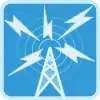 Technology portal
Technology portal -
 Random portalRandom portal
Random portalRandom portal -
 WikiProject PortalsWikiProject Portals
WikiProject PortalsWikiProject Portals
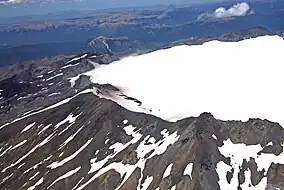

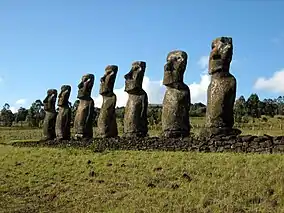


.jpg.webp)
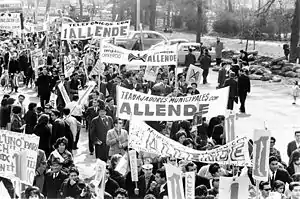
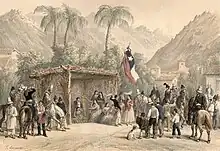
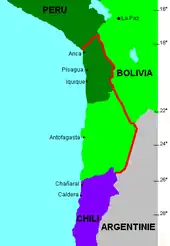
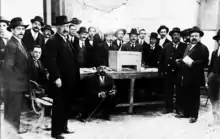
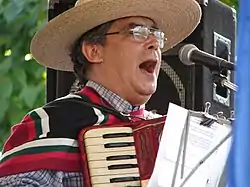
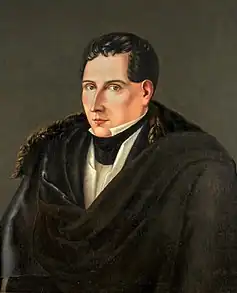
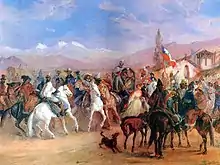

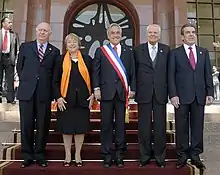
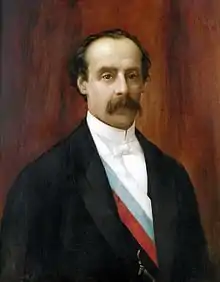
.svg.png.webp)

.jpg.webp)

